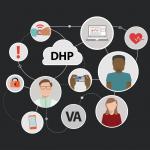Veterans Health Administration (VHA)
See the following -
SUBNETS Aims For Systems-Based Neurotechnology And Understanding For The Treatment of Neuropsychological Illnesses
DARPA seeks to develop new technology to enable near real-time measurement and analysis across brain systems to drive precise neural stimulation therapies Read More »
- Login to post comments
Team Demonstrates Digital Health Platform for Department of Veterans Affairs
 “Liberate the data.” That was a principal design goal for a team of public-private health care technology collaborators established by the U.S. Department of Veterans Affairs and Veterans Health Administration to develop a working and scalable proof-of-concept digital health platform (DHP) to support the department’s long-term vision. The open-source project demonstrated both proven and emerging technologies for interoperability and advanced functionality innovations from both the public and private sectors...
“Liberate the data.” That was a principal design goal for a team of public-private health care technology collaborators established by the U.S. Department of Veterans Affairs and Veterans Health Administration to develop a working and scalable proof-of-concept digital health platform (DHP) to support the department’s long-term vision. The open-source project demonstrated both proven and emerging technologies for interoperability and advanced functionality innovations from both the public and private sectors...
- Login to post comments
Test Highlights: How To Do EHR Data Sharing Right
The Department Veterans Affairs and the Substance Abuse and Mental Health Services Administration have demonstrated how to securely share sensitive health information via electronic health records (EHRs). Read More »
- Login to post comments
Too Many Agencies Rely On Costly, Ineffective Training
A new report by the Government Accountability Office points out that many federal training programs are duplicative, costly and/or ineffective, and that governmentwide virtual training may be agencies’ best solution to centralizing training and saving money. Read More »
- Login to post comments
Top 4 Care-Transition Benefits Of DoD, VA Joint iEHR
Caring for the nation's service members has never been easy. Providing world-class medical attention for the men and women of the Armed Forces from the front lines to the hospitals and clinics of the Veterans Administration (VA) is a daunting task that entails massive logistical and data hurdles. Read More »
- Login to post comments
Transforming Health Care Through A 360-Degree View Of Data
 How medical care can be substantially improved through a full spectrum view of all factors that affect health was the topic of Payam Etminani's presentation at the 2019 IDGA Veterans Benefits Conference in Washington D.C. Etminani, the CEO of Bitscopic, argued that the ability to view all health data including social, environmental and genomic information in addition to the traditional clinical measures (vital signs, blood work, history of illness etc), would lead to significant improvement in care. Etminani described how recent advances in Big Data and Artificial Intelligence (AI) make combining and using these large and widely varied sets of information possible. Read More »
How medical care can be substantially improved through a full spectrum view of all factors that affect health was the topic of Payam Etminani's presentation at the 2019 IDGA Veterans Benefits Conference in Washington D.C. Etminani, the CEO of Bitscopic, argued that the ability to view all health data including social, environmental and genomic information in addition to the traditional clinical measures (vital signs, blood work, history of illness etc), would lead to significant improvement in care. Etminani described how recent advances in Big Data and Artificial Intelligence (AI) make combining and using these large and widely varied sets of information possible. Read More »
- Login to post comments
Two New Federal Reports Released That Have Major Public Health Impacts
 Two new Federal reports were recently released that have a public health impact. First, the Office of the National Coordinator for Health Information Technology (ONC) released its 2022 Report to Congress: Update on Access, Exchange, and Use of Electronic Health Information. This report covers the current state of adoption of health information technology and access to electronic health information guided largely by the requirements of the 2016 21st Century Cures Act. The report observes that, “Although tremendous progress has been made with EHRs that capture and support the use of health information about individuals, the COVID-19 pandemic exposed gaps in health IT systems that support capturing and using population data. The challenges exposed during the public health response to the COVID-19 pandemic pinpointed the importance of health IT to monitor population health regarding public health surveillance of testing, diagnosis, and vaccine distribution.”
Two new Federal reports were recently released that have a public health impact. First, the Office of the National Coordinator for Health Information Technology (ONC) released its 2022 Report to Congress: Update on Access, Exchange, and Use of Electronic Health Information. This report covers the current state of adoption of health information technology and access to electronic health information guided largely by the requirements of the 2016 21st Century Cures Act. The report observes that, “Although tremendous progress has been made with EHRs that capture and support the use of health information about individuals, the COVID-19 pandemic exposed gaps in health IT systems that support capturing and using population data. The challenges exposed during the public health response to the COVID-19 pandemic pinpointed the importance of health IT to monitor population health regarding public health surveillance of testing, diagnosis, and vaccine distribution.”
- Login to post comments
U.K. Considers Adopting VistA
The United Kingdom is considering the U.S. Department of Veterans Affairs' VistA electronic health record system as it looks to expand open-source software for health IT. Read More »
- Login to post comments
United Kingdom Eyes VA’s Electronic Health Record
The Veterans Affairs Department and the United Kingdom’s National Health Service have teamed up to share ideas, strategies and leadership for development of health information technology, opening the possibility that the NHS could use VA’s electronic health record system. Peter Levin, the former VA Chief Technology Officer who retired this month, told Nextgov the Pentagon also should adopt VA electronic health record. Read More »
- Login to post comments
Unraveling Bureaucracy At The VA, One IT Project At A Time
How a small, fast SWAT team is improving performance at the Department of Veterans Affairs. Read More »
- Login to post comments
Using Open Technology To Build a Biodefense Against the Coronavirus
 As the number of US cases of the coronavirus rises, how will healthcare professionals be able to tell the difference between which panicked patients with similar symptoms has what? Even if the patient hasn't traveled to Wuhan or China recently, what if they sat at a Starbucks with someone who did? With the incubation time-lag before symptoms appear, who would even know? The challenge of monitoring 330 million people for infectious disease outbreaks is daunting. Take the flu as an example. During the last flu season which, as already discussed, was not as complex as this year's season, approximately 35.5 million Americans had flu symptoms, 16.5 million received medical care, 490,600 were hospitalized and 34,200 died.
As the number of US cases of the coronavirus rises, how will healthcare professionals be able to tell the difference between which panicked patients with similar symptoms has what? Even if the patient hasn't traveled to Wuhan or China recently, what if they sat at a Starbucks with someone who did? With the incubation time-lag before symptoms appear, who would even know? The challenge of monitoring 330 million people for infectious disease outbreaks is daunting. Take the flu as an example. During the last flu season which, as already discussed, was not as complex as this year's season, approximately 35.5 million Americans had flu symptoms, 16.5 million received medical care, 490,600 were hospitalized and 34,200 died.
- Login to post comments
Using the EHR and/or PHR to further Empower Patients
In her recent blog posts, Dr. Susan Woods talks about her personal journey on sharing notes with patients and how this affected her. You can also read more about the experiences of patients having full access to their electronic health records (EHR). Read More »
- Login to post comments
Using the Latest Advances in Data Science to Fight Infectious Diseases
 One of the most dramatic shifts in recent years that is empowering epidemiologists to be more effective at their jobs is occurring due to improvements in data technologies. In the past, the old "relational" data model dictated that data had to be highly structured, and as a result treated in distinct silos. This made it difficult, if not impossible, to analyze data from multiple sources to find correlations. Epidemiologists would spend many minutes or even hours on each query they ran to get results back, which is unacceptable when you need to test dozens of hypotheses to try to understand and contain a fast-moving outbreak. (Imagine how you would feel if each one of your Google searches took 45 minutes to return!) By contrast, using newer technologies, the same queries on the same hardware can run in seconds. Read More »
One of the most dramatic shifts in recent years that is empowering epidemiologists to be more effective at their jobs is occurring due to improvements in data technologies. In the past, the old "relational" data model dictated that data had to be highly structured, and as a result treated in distinct silos. This made it difficult, if not impossible, to analyze data from multiple sources to find correlations. Epidemiologists would spend many minutes or even hours on each query they ran to get results back, which is unacceptable when you need to test dozens of hypotheses to try to understand and contain a fast-moving outbreak. (Imagine how you would feel if each one of your Google searches took 45 minutes to return!) By contrast, using newer technologies, the same queries on the same hardware can run in seconds. Read More »
- Login to post comments
VA & SAMHSA test Exchange of Tagged Substance Abuse Data
The Veterans Affairs Department and the Substance Abuse and Mental Health Services Administration have demonstrated how to securely share sensitive health information while following confidentiality laws and patient disclosure wishes among providers using certified electronic health records (EHRs). Read More »
- Login to post comments
VA and VistA: Can they be fixed?

pivoting away from VistA, the agency's homegrown electronic health record system, would be a major shift for the VA. Former VA CIO Roger Baker said VistA is the only EHR designed by doctors, not technologists. "That is the real power of VistA, and it remains the real power of VistA," he added. The system, rooted in 1970s code, is designed to assist doctors in their daily work. Providers at the various VA medical facilities nationwide customize it for their specific needs.
- Login to post comments